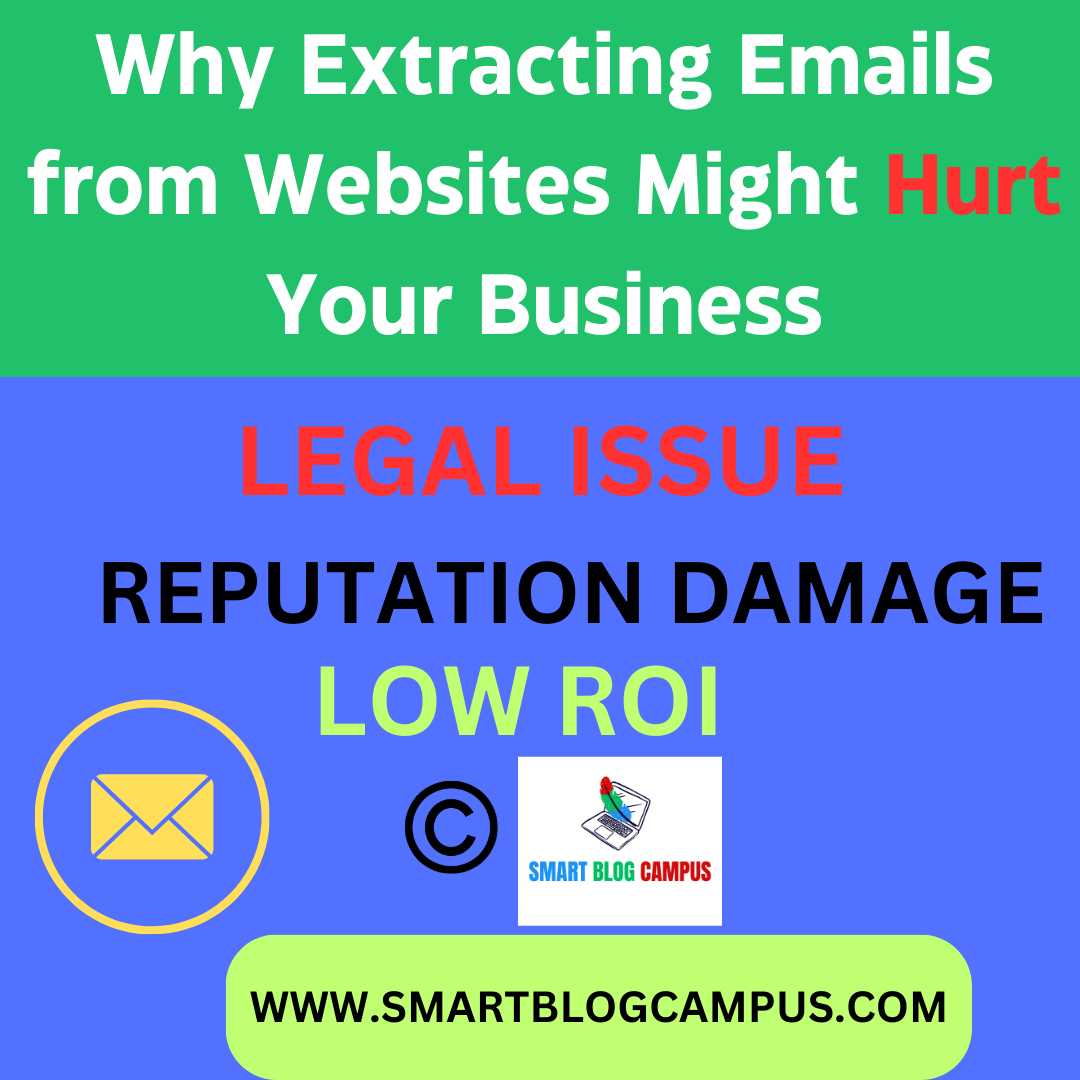Email extraction—using software or scripts to automatically pull email addresses from websites—may seem like a quick way to build a list of potential contacts. However, this seemingly innocent strategy can have serious consequences for your business, from legal and ethical challenges to damaging your brand reputation. Here’s why extracting emails from websites might hurt your business and why alternative, opt-in methods are far more sustainable.
1. Legal Risks and Compliance Issues
In recent years, data protection laws like the **General Data Protection Regulation (GDPR)** in Europe and the **California Consumer Privacy Act (CCPA)** in the U.S. have redefined what businesses can and cannot do with personal data. Email extraction, particularly if done without the consent of the individuals, can be classified as a violation of these laws, exposing your business to potential fines and legal action.
For example, GDPR mandates that businesses must obtain explicit consent before collecting or using personal data, which includes email addresses. Breaching these rules can result in hefty fines—up to €20 million or 4% of your company’s global revenue, whichever is higher. And it’s not just fines; businesses can face lawsuits and, in extreme cases, restrictions on operating in specific markets.
Solution: Invest in opt-in strategies like signup forms or gated content where users willingly share their information with you. This way, you not only stay compliant but also build a more engaged audience.
2. Damage to Brand Reputation
One of the biggest intangible assets for any business is its reputation. When people find out their emails were collected without permission and used for unsolicited marketing, it can severely impact your brand’s image. Your business may be perceived as intrusive or spammy, which not only damages trust with prospective customers but also makes it harder to retain existing clients.
Moreover, customers today are increasingly wary of privacy violations, and even a single instance of unsolicited outreach can lead to a public backlash. With online reviews and social media, people share their grievances widely, which could result in negative exposure for your brand.
Solution: Build your email list by offering value to potential customers. Use incentives such as discounts, exclusive content, or educational resources in exchange for email sign-ups to ensure that your subscribers actually want to hear from you.
3. High Spam Complaint Rates and Blocked Email Domains
When you extract emails from websites, you’re reaching out to people who likely haven’t heard of your brand or haven’t agreed to receive emails from you. This can lead to high spam complaint rates, which hurts your email deliverability. Major email service providers like Gmail and Outlook use algorithms to monitor spam complaints, and repeated offenses can result in your domain or IP address being flagged as spam.
Once your domain is flagged, getting your emails to land in inboxes becomes significantly harder—even for people who have opted in. Your marketing efforts will be disrupted, reducing the effectiveness of your email campaigns.
Solution: Keep your email list clean by using double opt-in methods where users confirm their interest. This helps you maintain high deliverability and ensures that your messages reach people who are actually interested in your offerings.
4. Poor Quality Leads and Low ROI
While extracting emails might add numbers to your email list quickly, the quality of those leads is often poor. People whose emails were scraped off websites are unlikely to have an interest in your products or services, and engaging uninterested leads can lead to low engagement and conversion rates. As a result, you’ll spend more on email campaigns without seeing a return on investment (ROI).
Effective email marketing is about quality, not quantity. A list of engaged and interested contacts will yield better results than a large, disengaged audience. Sending emails to people who aren’t interested can result in low open rates, high unsubscribe rates, and limited impact on your overall revenue.
Solution: Focus on lead nurturing through content marketing, social media, and targeted advertising. When you attract people genuinely interested in your business, you’ll see a better return on every email you send.
5. Increased Cybersecurity Risks
Extracting emails using web scraping tools comes with potential cybersecurity risks. Some of these tools or services may not be entirely secure, and using them can expose your company to vulnerabilities such as malware, spyware, or phishing attacks. Additionally, when you store large volumes of data that hasn’t been obtained with consent, it becomes a cybersecurity liability. Should a data breach occur, not only are you liable for mishandling data, but you also risk losing the trust of everyone associated with your business.
Solution: Safeguard your business by collecting data responsibly and maintaining secure storage practices. By using ethical and compliant methods, you can protect your business from unwanted cybersecurity issues.
6. Fines and Penalties for Non-Compliance
Many email marketing platforms, including Mailchimp and Constant Contact, have strict compliance policies regarding how you build your email list. If your email list includes contacts obtained through email scraping, your account may be flagged or even banned from these platforms. This can limit your ability to run campaigns effectively and could require you to start from scratch with a new email provider, which is costly and time-consuming.
Solution: Maintain a clean list that aligns with the terms of service of your email marketing platform. This will save you from disruptions and allow your campaigns to thrive without risk.
Alternative Strategies for Effective Email Collection
If you’re looking to build a robust email list, there are numerous ethical and effective ways to do so:
– Create engaging, gated content like eBooks, reports, or guides that users can download by entering their email.
– Use pop-ups or slide-ins on your website to invite visitors to join your email list for exclusive offers, updates, or discounts.
– Leverage social media advertising to capture leads through targeted opt-in campaigns.
Final Thoughts
While extracting emails from websites may seem like an easy solution for growing your contact list, it comes with numerous risks that could ultimately hurt your business. Instead, investing in organic list-building methods, staying compliant with data privacy laws, and nurturing leads ethically are far more effective strategies. Not only will these practices help you avoid legal and reputational pitfalls, but they will also build a loyal, engaged audience that supports your brand for the long term.

